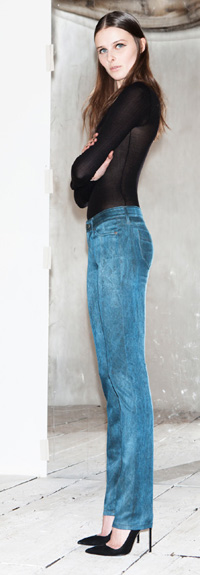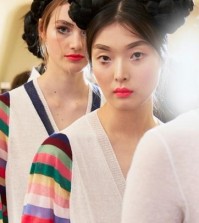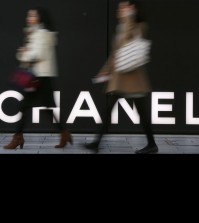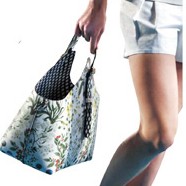- California Assembly OKs highest minimum wage in nation
- S. Korea unveils first graphic cigarette warnings
- US joins with South Korea, Japan in bid to deter North Korea
- LPGA golfer Chun In-gee finally back in action
- S. Korea won’t be top seed in final World Cup qualification round
- US men’s soccer misses 2nd straight Olympics
- US back on track in qualifying with 4-0 win over Guatemala
- High-intensity workout injuries spawn cottage industry
- CDC expands range of Zika mosquitoes into parts of Northeast
- Who knew? ‘The Walking Dead’ is helping families connect
Reinvention of hanji
Korea’s eco-friendly denim rising on int’l fashion stage
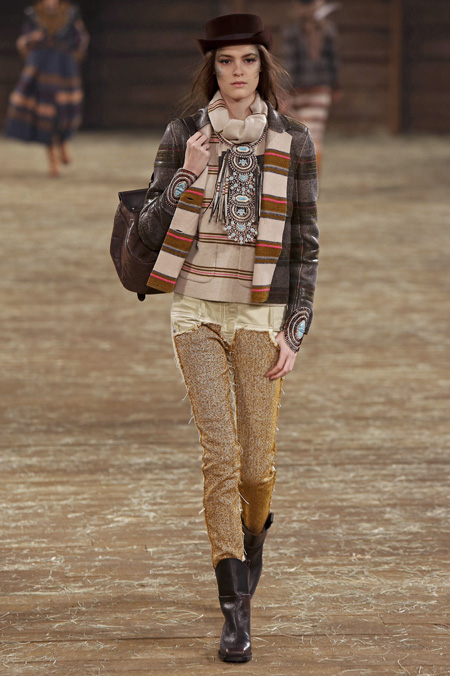
A model walks on a runway wearing pants made from TROA’s hanji fabric during Chanel’s Pre-Fall 2014 fashion show in Dallas, Texas on Dec. 10.
(Courtesy of Evans Caglage / Firstview.com)
By Chung Ah-young
Jeans made from Korean traditional fabric using “hanji” or paper yarn are making waves on the world fashion scene. The premium denim launched by TROA, a Korean fashion brand, hit the runways at the Chanel-Dallas Show in the United States on Dec. 10. The hanji denim, tinged with gilded ecru, is part of Chanel’s Pre-Fall Collection 2014 and will be on sale starting from May next year and available at the brand’s shops worldwide.
The hanji jeans developed by TROA have already been launched at Barneys in New York, Beverly Hills and San Francisco and Barneys Japan and Colette in Paris, France during last season.
“Hanji” was invented some 1,600 years ago in Korea. Using the mulberry paper, the material has a unique look and feel due to the soft inner skin of the tree branches. The paper is cut into very fine strips and twisted to make mulberry paper yarn which is then used to make the fabric.
“Derived from the supple inner bark of the mulberry tree, hanji denim is softer and lighter than pure cotton denim, and yet more durable and better able to hold its shape. The paper yarn gives the fabric a feeling of airiness and lightness for a very comfortable fit,” the company said in a press release.
According to the company, to produce the hanji denim, skilled craftsmen hand-dye each garment through a laborious process of applying natural substances, such as indigo for blues, sappan wood for reds and a chestnut bur for shades of grey. Many of the dyes are obtained from medicinal plants used in traditional Oriental medicine. “The color of the denim is quite special and unique compared to chemically-dyed denim,” said the company.
TROA’s hanji denim was created by executive creative director Han Song in a bid to find a non-toxic method of producing denim in order to make the eco-friendly garment using natural dyeing techniques. Since 2004, the designer has focused on developing naturally dyed eco-friendly fabric.
“It’s very encouraging that TROA’s hanji denim has been recreated into the Chanel vision, one of the world’s top luxury brands, and launched in global markets. The excellence of hanji and natural dyes is a great discovery. The innovative hanji denim is grabbing people’s attention. Fashion should win the hearts of people with its design,” the designer said.
Song said that the Chanel staff who visited to see the process of producing the fabric in Seoul applauded the quality of the material made through multi-layered phases and sophisticated techniques. “The fabric holds its shape beautifully and absorbs the natural dyes incredibly well,” he said.
The company said that its latest debut in the global fashion market is a case example in how to successfully turn traditional materials into a contemporary product which can be shared by other countries.
TROA established its branch in New York in 2012. Sarah Sung, President of TROA New York, said that its fabric made from its natural dyes is attractive to modern consumers who tend to be environmentally conscious. “Now is the time when the luxury brands represent the eco-friendly products. Consumers have a strong perception toward environmental protection from toxic substances. Our hanji denim caters to the desires of consumers who are conscious of the environment,” Sung said.
Renowned designer Troa Cho created her namesake brand some 40 years ago in Seoul for high-end, cutting-edge attires particularly for women. Her son, Han Song, became the executive creative director of the firm eight years ago.
With his roots in couture, Song has built up a reputation as an innovative designer after winning the prestigious New Designer of the Year Award from the Seoul Fashion Group. He also designed the official uniforms for South Korea during the Asia Games. He has since introduced his lines in New York, Paris Haute Couture, Seoul Fashion Week and Beijing Fashion Week.







